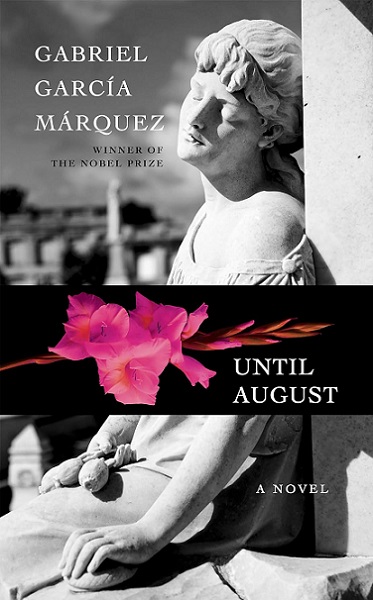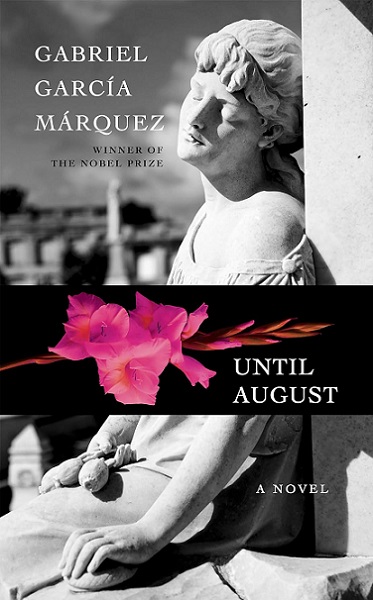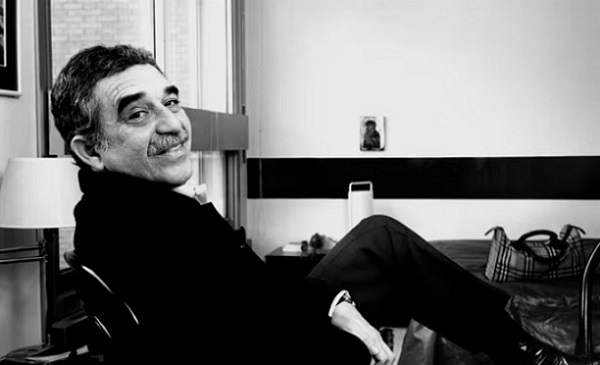
The full title of this review article by Lucy Hughes-Hallett (The Guardian) is “Until August by Gabriel García Márquez review – a ‘lost’ last novel.” Hughes-Hallett writes, “This slight work by the Latin American master explores sex, betrayal and damaging secrets through the story of a woman’s one-night stands.”
Once a year, in August, a middle-aged woman travels to a Caribbean island to lay flowers on her mother’s grave. On the eighth of these pilgrimages, without premeditation, she invites a man who – like her – is sitting alone in the hotel bar, to come up to her room. They make love. Their excitement is mirrored by turbulent weather: there is a thunderstorm and blue herons fly agitated over the lagoon. When she wakes in the morning the man has gone. She doesn’t even know his name. Afterwards, every year, she sets out to repeat the experience with another stranger.
That, in bald outline, is the plot of this short novel, the last that Gabriel García Márquez wrote, published nearly a decade after his death. No one, except for the publicists whose job it is to do so, is pretending that it is a masterpiece, lost and now regained. García Márquez himself told his sons, knowing that he was losing his memory to dementia, “This book doesn’t work. It must be destroyed.”
The sons, after setting it aside for years, thought again and decided that, though it is “not, of course, as polished as his greatest books”, and despite its “rough patches”, they should “betray” their father by giving it to the world.
The novel’s protagonist, Ana Magdalena Bach, is initially pleased with her adventure. She wakes up imagining she has enjoyed a night of pleasure without responsibilities or consequences, what Erica Jong once called “a zipless fuck”. Then she finds that her one‑night partner has left a $20 bill tucked into her bedside book. She is shocked. She thought she was being free: he thought she was being bought.
It is the first of a sequence of disappointments. Each of Ana Magdalena’s subsequent nights on the island is compromised in a different way. One of her pick-ups turns out to be “a swindler who pimped helpless widows, the probable murderer of two of them”. Another year the only man who offers himself is an old friend, her daughter’s godfather, out of the question as a one-night stand but so insistent on squiring her to dinner that she has no time to find a more suitable partner.
Another is a decent but dull insurance salesman who tells jokes clumsily, although he later reveals “magical mastery in bed”. The fantasy of the island as a garden of earthly delights, offering sensual pleasure and the freedom of anonymity, is eroded. An erotic fantasy turns into something more melancholy.
Time is passing. Ana Magdalena’s first visit to the island involves a terrifying four-hour trip through rough seas in a canoe with a little outboard engine. The next year there is a proper motorboat. Later, there is a ferry, travelling twice daily to and from her home city (never named) with “air-conditioning, a band, and pleasure girls”. On her first visits she is struck by the islanders’ poverty and haunted by the number of “black fishermen with mutilated arms from the premature explosions of dynamite sticks”.
Later, hotels like “towering cliffs of glass” overshadow the village, and one year she finds all the hotel rooms taken by delegates to an international tourist convention. There is change, but no progress: the local people remain destitute as ever. The book takes on a plangent note. In the cemetery where her mother is buried, graves are dug up and exhumed bones left lying around.
Back in the city, things aren’t going well, either. At the outset, Ana Magdalena’s marriage was perfect. Her husband was handsome, a musician and director of a conservatoire, good at everything from table tennis to conjuring tricks to grandmaster-level chess. They had frequent and delicious sex. Their children were talented and confident, too (although they worried about their daughter’s determination to become a nun).
But the secret of Ana Magdalena’s island adventures corrodes their marriage. If she can be unfaithful – she realises – so, perhaps, can he. Jealousy enters. By the end of the story he is only an “occasional guest in her bed”.
The narrative style is cool. We watch Ana Magdalena as she gets dressed, hails taxis and drinks gin. We are informed of her emotional state, but are not invited to feel it. We are told what she is reading – Dracula, L’Étranger, The Old Man and the Sea – all perhaps clues to her state of mind or to García Márquez’s intentions, but not easily interpreted. The novel reads like a film treatment: plenty of observation, little interiority, a spareness that would make it easily transferable to cinema. [. . .]
Read full review at https://www.theguardian.com/books/2024/mar/06/until-august-by-gabriel-garcia-marquez-review-a-lost-last-novel
[Photo above by Ulf Andersen/Getty Images: García Márquez in 1982.]
The full title of this review article by Lucy Hughes-Hallett (The Guardian) is “Until August by Gabriel García Márquez review – a ‘lost’ last novel.” Hughes-Hallett writes, “This slight work by the Latin American master explores sex, betrayal and damaging secrets through the story of a woman’s one-night stands.” Once a year, in August, a







